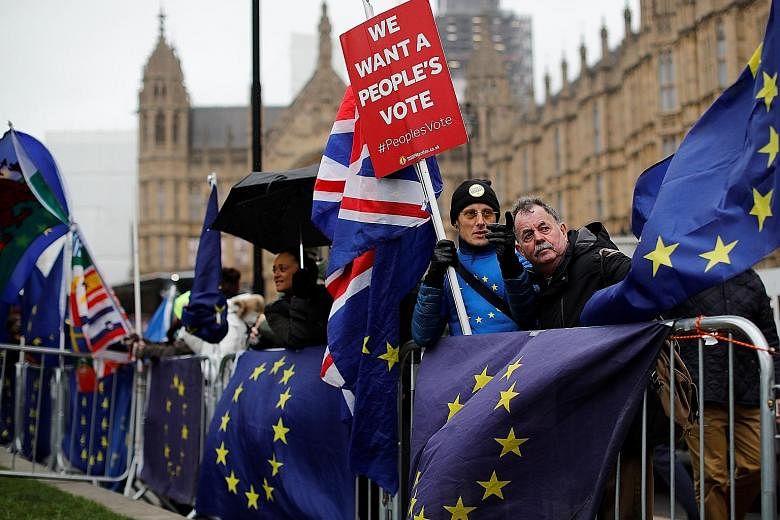Prime Minister Theresa May's Brexit proposal was so overwhelmingly rejected on Tuesday that it plunged Britain into deeper uncertainty while raising hopes that the government might be forced to explore alternative approaches, including pushing back the March 29 deadline for leaving the European Union to avoid crashing out without a deal.
The pound rallied immediately after British lawmakers voted 432 to 202 against Mrs May's deal, the country's worst parliamentary defeat in modern history.
"The two big takeaways for markets from this are that, one, this deal is dead and, two, lawmakers might have to explore other creative options to avoid a no-deal Brexit," Mr Timothy Graf, the London-based head of macro strategy at State Street Global Advisors, told Reuters.
British finance chief Philip Hammond floated the possibility of delaying the departure beyond the March 29 deadline in a conference call with main British business lobby groups and technology giant executives an hour after the vote, reported Bloomberg.
Mrs May's government faced a vote of no confidence this morning, Singapore time, but most observers said it was unlikely to be toppled.
Should she survive, she has promised to hold cross-party talks to identify "genuinely negotiable" Brexit approaches that can get sufficient support in Parliament and return to the EU for renegotiations.
That seems difficult, with different factions pulling in different directions.
The vote against Mrs May's Brexit deal reflected the deep disagreements on a compromise plan that could win majority support, with her own party divided on the shape of any final deal to leave the EU, while 71 lawmakers of the opposition Labour Party urged their leader Jeremy Corbyn to swing behind a second referendum on remaining a part of the EU.
Meanwhile, the red lines that Mrs May has drawn over leaving the Customs union and having an open border with EU member Ireland have made it impossible to get her deal approved thus far.
Still, the result of Tuesday's vote was, strangely, celebrated by both sides - hardcore Brexiteers who thought the deal did not go far enough in severing ties with the EU, and pro-EU activists who saw the vote as a setback for Brexit itself.
There were conflicting signals coming out from within the EU.
A French presidency official said the EU would not budge on Brexit principles, while German Chancellor Angela Merkel did not rule out further clarifying Britain's future ties to the bloc.
A spokesman for European Council President Donald Tusk said that the vote had increased the risk of a disorderly exit, and that while the EU did not want that to happen, it would be prepared for it.
"The EU27 will remain united and responsible as we have been throughout the entire process, and will seek to reduce the damage caused by Brexit. We will continue our preparations for all outcomes, including a no-deal scenario," said the spokesman.
And while German Economy Minister Peter Altmaier hinted that Britain could be given an extension, key Brexit negotiator Guy Verhofstadt said that any extension would not go past the European Parliament elections in May.
"What we will not let happen, deal or no deal, is that the mess in British politics is again imported into European politics," he wrote on Twitter.
For now, both the ruling Conservative Party and opposition Labour Party made clear that neither wants Brexit without a deal.
Responding to the defeat in Parliament on Tuesday, Mrs May said: "To those who fear the government's strategy is to run down the clock to March 29: That is not our strategy. I have always believed the best way forward is to leave in an orderly way with a good deal, and have devoted much of the last two years to negotiating such a deal."
Likewise, Mr Corbyn said "no-deal must be taken off the table".
Observers in Singapore were not so sanguine.
"As it becomes harder to predict the future of the UK market and the rules it will play by, companies have to be prepared for the worst-case scenario - a no-deal Brexit," said Mr Ho Meng Kit, chief executive officer of the Singapore Business Federation.












